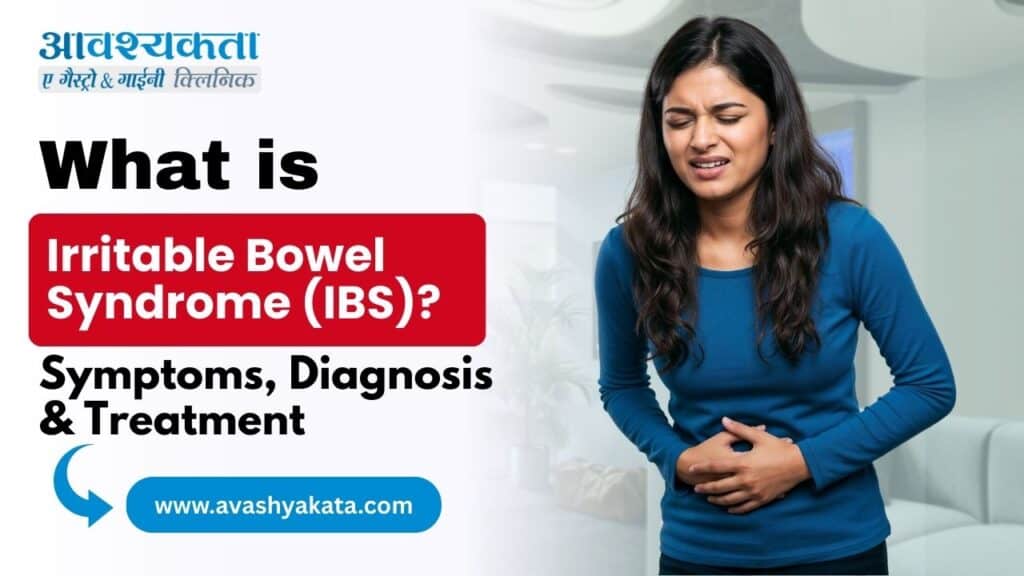
Irritable Bowel Syndrome (IBS) is one of the most common digestive issues, but many people suffer in silence because the symptoms can be confusing, unpredictable and embarrassing. If you experience stomach pain, bloating or sudden changes in your bowel habits, this guide will help you understand what IBS really is and how it affects your daily life. We want to make this complex condition simple so you can take the right steps to better gut health.
In this article, we break down IBS symptoms, diagnosis and treatment simply and practically. Whether you’re newly experiencing digestive discomfort or looking for ways to manage long-term issues, this blog will give you straight answers from medical experts.
What Is Irritable Bowel Syndrome (IBS)?
Irritable Bowel Syndrome (IBS) is a functional gut disorder where your gut works abnormally, even though there is no damage to the intestines. This means the structure of the digestive system looks normal, but the way it moves, reacts and communicates with the brain is not normal. IBS causes symptoms like abdominal pain, bloating, gas, diarrhoea, constipation or a mix of both. These symptoms come and go and can be mild to severe, making life uncomfortable.
IBS is not an infection, food allergy or life-threatening disease. It’s a long-term condition related to how your gut muscles function, the sensitivity of your intestines, and how your brain and gut communicate – the gut-brain axis. Because of this stress, diet and lifestyle can strongly impact IBS symptoms. Understanding what IBS is helps you know that the problem is real, manageable and treatable with the right approach. This blog will guide you through the symptoms, diagnosis and treatment options so you can take informed steps towards better digestive health.
How Common Is IBS — Prevalence & Epidemiology
Irritable Bowel Syndrome (IBS) is one of the most common digestive disorders in the world. Here’s a quick rundown to give you an idea:
- 10-15% of the global population has IBS; that’s a lot of digestive discomfort.
- Many people experience bloating, stomach pain, constipation or diarrhea but don’t seek medical help, so the actual number is probably even higher.
- In Canada, IBS is also very common among adults, especially those with long-term digestive issues.
- IBS can happen at any age, but is more often diagnosed in people under 50.
- Women experience IBS more than men, probably due to hormonal and biological reasons.
- Symptoms can be mild to severe, affecting daily routines, work life and emotional well-being.
Causes & Risk Factors of IBS
What causes Irritable Bowel Syndrome (IBS)?
It turns out there’s no one-size-fits-all explanation for IBS – it’s more like a complex web of factors all conspiring to affect just how the digestive system operates. The experts figure that IBS is linked to a few key areas, like issues in the gut and brain connection getting out of sync, changes in how the gut moves its contents along, and the intestines just being way too sensitive. And here’s the thing, even when everything is supposed to be working just fine, normal digestion can still end up causing pain, bloating, and irregular bowel movements.
What raises my chances of getting IBS?
There are several factors that can increase your chances of getting IBS. Stress and anxiety, for example, are major contributors because they can pretty much mess with your gut at a basic level. People who’ve had stomach infections in the past, who have food intolerances, or who just happen to be super sensitive to digestive issues in general are more likely to develop IBS. And for some people, getting a gut reaction to certain foods (like dairy, greasy meals, caffeine, or foods that are just too high in certain compounds) can really make symptoms worse. Even hormonal changes in women can make IBS symptoms a lot more intense. So, getting a handle on all these potential causes and risk factors is like the first big step towards actually managing IBS in a way that really works for you.
Types or Subtypes of IBS
Irritable Bowel Syndrome (IBS) is not the same for everyone. Doctors classify it into different subtypes based on the kind of bowel habits you experience most often. Understanding your IBS subtype is important because it helps guide the right treatment plan and makes symptom management much easier.
IBS-D (Diarrhoea-Predominant IBS)
People with IBS-D mostly struggle with frequent loose stools, sudden urges to use the washroom, and abdominal cramping. This subtype often causes anxiety because symptoms can appear without warning.
IBS-C (Constipation-Predominant IBS)
IBS-C usually leads to infrequent bowel movements, hard stools, bloating, and discomfort. Many people feel like they can’t completely empty their bowels, which can be frustrating and painful.
IBS-M (Mixed IBS)
IBS-M involves a mix of both diarrhea and constipation. This pattern can shift from week to week, making it difficult for people to understand what triggers their symptoms.
IBS-U (Unsubtyped IBS)
IBS-U is when symptoms don’t fit perfectly into any one category. You may have general IBS symptoms—like pain, gas, or bloating—but your stool pattern doesn’t clearly match IBS-D, IBS-C, or IBS-M.
Each subtype of IBS behaves differently, which is why recognizing your pattern helps your healthcare provider choose the most effective treatment. Understanding these subtypes is the first step toward gaining control over your digestive health.
Symptoms of IBS
Irritable Bowel Syndrome (IBS) can affect people in different ways. Here are the most common symptoms, explained clearly so you can easily identify what you may be experiencing:
Common Digestive Symptoms
- Abdominal pain or cramping — usually improves after passing stool.
- Bloating and gas — a heavy or full feeling in the stomach.
- Changes in bowel habits, such as:
- IBS-D: frequent loose stools or diarrhea.
- IBS-C: infrequent or hard stools (constipation).
- IBS-M: a mix of constipation and diarrhea.
- A feeling of incomplete bowel movement, even after using the washroom.
- Mucus in the stool is common in people with IBS.
Other Symptoms
- Urgency to pass stool, especially in IBS-D.
- Irregular bowel movements, often linked to food triggers or stress.
- Stomach discomfort or pressure, especially after meals.
- Fatigue or low energy, due to ongoing digestive issues.
Diagnosis of IBS
Diagnosing Irritable Bowel Syndrome (IBS) can feel confusing because there is no single test that confirms it. Instead, doctors use a combination of your symptoms, medical history, and a few basic tests to rule out other digestive conditions. The main goal is to understand your pattern of abdominal pain, bowel habits, and how long these symptoms have been happening. Most people are diagnosed based on clear symptom criteria rather than extensive testing.
Doctors often use the Rome criteria, which look for ongoing belly pain along with changes in stool frequency or appearance for at least three months. They may also order simple tests such as blood work, stool tests, or an ultrasound to check for infections, inflammation, or food-related issues. In some cases, additional tests like endoscopy or colonoscopy are done if there are “red flag” signs such as bleeding, unexplained weight loss, or severe nighttime symptoms. Once other serious problems are ruled out, your doctor can confidently diagnose IBS and recommend a personalized treatment plan.
Treatment & Management of IBS
Managing IBS is a combination of lifestyle changes, diet adjustments and targeted treatments based on the type of IBS you have. Since IBS affects everyone differently, the goal is to find what works for your body and reduce flare-ups and increase daily comfort. The right plan can control abdominal pain, irregular bowel habits, bloating and digestive discomfort.
1. Lifestyle Changes That Support Gut Health
Simple changes make a big difference. Regular exercise, staying hydrated and a consistent sleep schedule can help your digestive system function better. Stress plays a big role in IBS symptoms, so practices like deep breathing, meditation and light yoga can calm the gut–brain axis and reduce flare-ups.
2. Diet Modifications for IBS Relief
Diet is one of the most powerful tools for managing IBS. Many people benefit from a low-FODMAP diet, which reduces foods that are harder to digest. This may include certain fruits, vegetables, dairy products and legumes. Keeping a food diary can also help you identify personal triggers such as spicy foods, caffeine, fried items or artificial sweeteners. Balanced fibre intake—especially soluble fibre—can help constipation-predominant IBS, while avoiding too much insoluble fibre can help diarrhoea-predominant IBS.
3. Medications Based on IBS Type
When lifestyle and diet changes aren’t enough, doctors may recommend medications based on your IBS subtype:
- IBS-C (constipation): fibre supplements, osmotic laxatives, stool softeners
- IBS-D (diarrhea): anti-diarrheal medicines or gut-targeted antibiotics
- General symptoms: antispasmodics for cramping, probiotics or medicines that calm gut sensitivity
4. Mind–Body Therapies
Since IBS is connected to the gut-brain axis, emotional well-being plays a big role in symptom control. Techniques like Cognitive Behavioural Therapy (CBT), relaxation therapy or guided mindfulness can help ease pain and reduce anxiety linked flare-ups. These are especially helpful for people whose symptoms worsen during stress.
5. Building a Long-Term Plan
It’s a chronic condition, but with the right plan, most people can live well. Follow-ups with a gastroenterologist, knowing your triggers and making small changes can keep symptoms in check. With care, many people can go long periods symptom-free and feel better.
Also Read: https://avashyakata.com/9-hidden-reasons-why-your-stomach-is-always-bloated/
Conclusion
Living with Irritable Bowel Syndrome (IBS) can feel frustrating, but understanding your symptoms and getting the right treatment can make a big difference. With simple lifestyle changes, diet adjustments, and guidance from a gastroenterologist, most people can manage IBS effectively and enjoy better digestive health. Since IBS affects everyone differently, finding your personal triggers and following a long-term plan is key. Whether you experience constipation, diarrhea, or mixed symptoms, there are proven strategies to help you feel better. Remember—IBS is manageable, and the right support can help you live a comfortable, confident, and healthy life.
Frequently Asked Questions
1. What is the main cause of IBS?
The exact cause of Irritable Bowel Syndrome isn’t fully known, but experts believe it involves a mix of gut sensitivity, stress, and changes in how the brain and gut communicate. Some people also have IBS symptoms due to food intolerances, infections, or hormone changes. It’s usually a combination of factors rather than a single cause.
2. Can IBS go away on its own?
IBS is a long-term condition, but symptoms can improve or even disappear for long periods with proper management. Many people find relief through diet changes, stress control, and medications when needed. While IBS may not completely “go away,” it can be well-controlled with the right plan.
3. What foods should I avoid if I have IBS?
Foods that commonly trigger IBS symptoms include high-FODMAP foods like certain fruits, onions, garlic, dairy products, beans, and processed foods. Some people are sensitive to caffeine, alcohol, fried foods, and artificial sweeteners. Keeping a food diary can help you identify what triggers your own symptoms.
4. How is IBS diagnosed?
Doctors usually diagnose IBS based on symptoms, medical history, and the Rome IV criteria. In some cases, tests like blood work, stool tests, or imaging may be done to rule out other conditions. A gastroenterologist can confirm the diagnosis and guide you through the next steps.
5. What is the best treatment for IBS?
The best treatment depends on your IBS type—IBS-C, IBS-D, or mixed IBS. Many people find relief with a low-FODMAP diet, fiber adjustments, stress management, probiotics, or medications. Your doctor will tailor a treatment plan that works for your specific symptoms.

